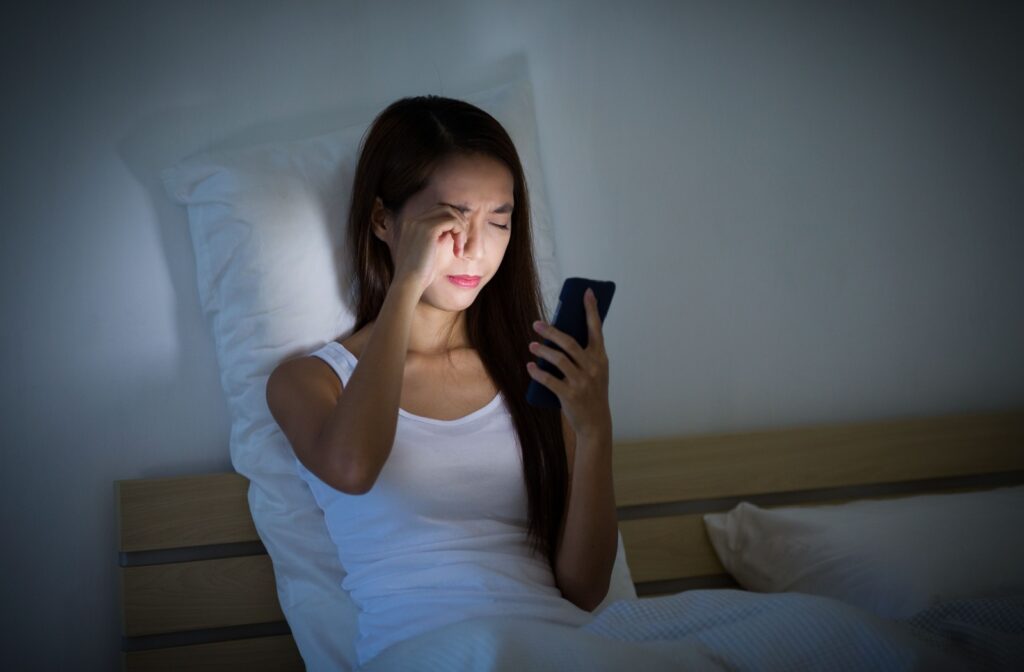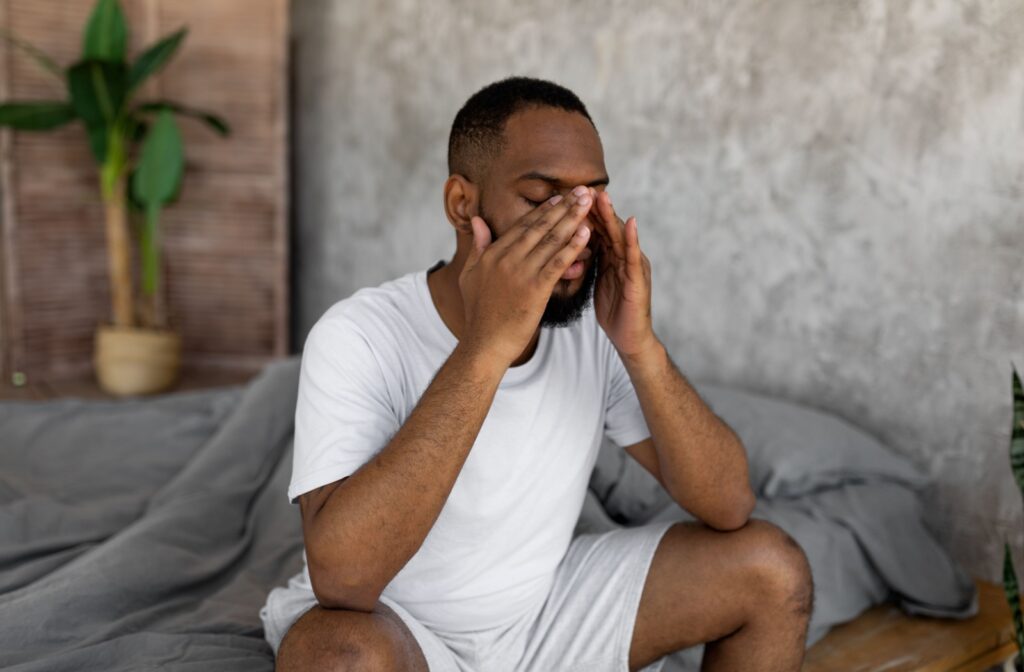Waking up to dry, gritty, and uncomfortable eyes is hardly the best start to anyone’s day. For many, it’s an ongoing dilemma that negatively affects their morning and overall eye health and quality of life.
Waking up with dry eyes is usually a result of poor eye lubrication while sleeping.
Factors that influence dry eyes during sleep include incomplete lid closure, reduced tear production, environmental factors, poor contact lens wear, and eye strain.
What is Dry Eye Disease?
Dry eye disease is a common eye condition that affects around 16 million Americans.
Dry eyes occur when your eyes don’t produce enough tears to keep your eye hydrated or when tears evaporate too quickly, leading to irritation, inflammation, and sometimes damage to the eye’s surface.
There are two main types of Dry Eye Disease:
- Aqueous Tear-Deficient Dry Eye: The eyes don’t produce enough tear fluid to maintain a healthy eye surface.
- Evaporative Dry Eye: This is the most common form of dry eye and occurs when tears evaporate too quickly due to an imbalance in tear composition, often linked to Meibomian Gland Dysfunction (MGD). When these glands become clogged, less oil can keep the eye hydrated, resulting in dry eyes.
Dry eyes can develop from several causes, including aging, certain medications, some medical conditions, environmental factors like allergies, windy, or dry climates, and prolonged screen use.
Symptoms of dry eyes typically include:
- Stinging or burning sensation in the eyes
- Redness and irritation
- Blurry vision
- Feeling like something is in your eyes
- Watery eyes
Sleep-Related Factors Resulting in Dry Eyes
Dry eyes may develop while sleeping for a variety of different reasons. Often, this is related to conditions that decrease tear production, increase tear evaporation, or both, while sleeping.
Factors that may disturb our tear film while sleeping and lead to dry eyes in the morning can include:
- Incomplete Lid Closure: If your eyelids don’t fully close during sleep, a condition known as nocturnal lagophthalmos, the tear film covering the eye can evaporate more rapidly than it is replenished, leading to dryness.
- Reduced Tear Production: Tear production naturally decreases during sleep because our body goes through various cycles of deep and light sleep. For most people, this doesn’t cause any problems, but if you already have dry eye syndrome, this reduction in tear production can exacerbate symptoms overnight.
- Environmental Factors: Low humidity levels in your bedroom can increase tear evaporation while you sleep, especially in air-conditioned or heated rooms. Fans circulating air near your face can also contribute to drying out your eyes.
- Contact Lens Wear: Sleeping in contact lenses, especially if they’re not designed for overnight wear, can restrict oxygen flow to the cornea and trap debris, leading to irritation and dryness.
- Eye Strain: Although not directly related to sleeping, heavy use of digital devices before bedtime can lead to eye strain and reduced blinking, which can diminish the tear film’s quality before sleep. This may not provide sufficient moisture to last through the night comfortably.
Understanding the underlying cause of your dry eyes is important for effective management. An optometrist can conduct thorough examinations to pinpoint the specific type of dry eye disease you have and recommend the best course of treatment.

How to Prevent Dry Eyes While Sleeping
Visiting your optometrist to determine the cause of your dry eyes can help develop the appropriate treatment option. If your dry eyes are the result of sleep-related factors, consider implementing the following:
- Humidifier: Use a humidifier in your bedroom to maintain optimal humidity levels to prevent excessive dryness in the air that can affect your eyes.
- Stay Hydrated: Drink plenty of water throughout the day to promote overall hydration, which can help prevent dry eyes. Aim to drink about 8 to 10 glasses of water a day!
- Eye Ointment: Apply a preservative-free eye ointment to the lash line before bedtime to help retain moisture and prevent dryness throughout the night. The ointment is thick like a cream and will make your vision slightly blurry.
- Eyelid Wipes: Use eyelid wipes to gently keep your eyelids clean and free from debris to reduce the risk of eye irritation and dryness while sleeping.
- Artificial Tears: Use preservative-free artificial tears to help lubricate the eyes before bed. If you’re using both artificial tears and an eye ointment to provide dry eye relief, use the artificial tears first and wait at least 10 minutes before applying the ointment.
- Warm Compress: Use a warm compress on your closed eyes and gently massage around the area for a few minutes before going to bed to help stimulate tear production and alleviate dryness.
- Limit Screen Time: Minimize screen time before bed to reduce eye strain and potential dryness caused by prolonged exposure to digital devices.
By incorporating these strategies into your routine, you can proactively mitigate dry eyes while sleeping and promote better eye health overall!
Treating dry eyes is important because untreated dry eye syndrome can lead to various uncomfortable symptoms and potential complications. If left unaddressed, dry eyes can worsen over time and result in serious concerns such as corneal damage and increased risk of eye infections.
Advanced Dry Eye Therapy
Some individuals may experience relief from sleep-related dry eye concerns by implementing lifestyle choices and using over-the-counter solutions. However, others may benefit from advanced dry eye therapies.
At Eye Lab, we provide a couple of advanced solutions for dry eye therapy:
The TearCare system utilizes a targeted application of controlled heat to the eyelids to help unblock the meibomian glands, encouraging the natural production of oils that are essential for a healthy tear film. TearCare can be used as an alternative to a warm compress!
TempSure is a treatment option that utilizes radiofrequency energy to provide relief for patients suffering from dry eye syndrome, by targeting clogged meibomian glands. TempSure is also a great treatment to address incomplete blinking, a condition where the eyelids don’t fully close, which can lead to dry eyes. It’s a quick and simple treatment that requires no downtime for the patient.
Both advanced treatment options can be used in addition to lifestyle changes and over-the-counter solutions to help provide long-term treatment for dry eyes.
Schedule a Dry Eye Appointment in Scottsdale
Waking up with dry eyes in the morning is uncomfortable and can be a sign of unaddressed dry eye disease. For individuals already experiencing dry eyes several sleep-related factors can worsen these symptoms.
Understanding the cause and symptoms of dry eyes can help provide your optometrist with the appropriate treatment option for your eye concerns. Contact our team at Eye Lab in Scottsdale to book your next eye exam appointment!





